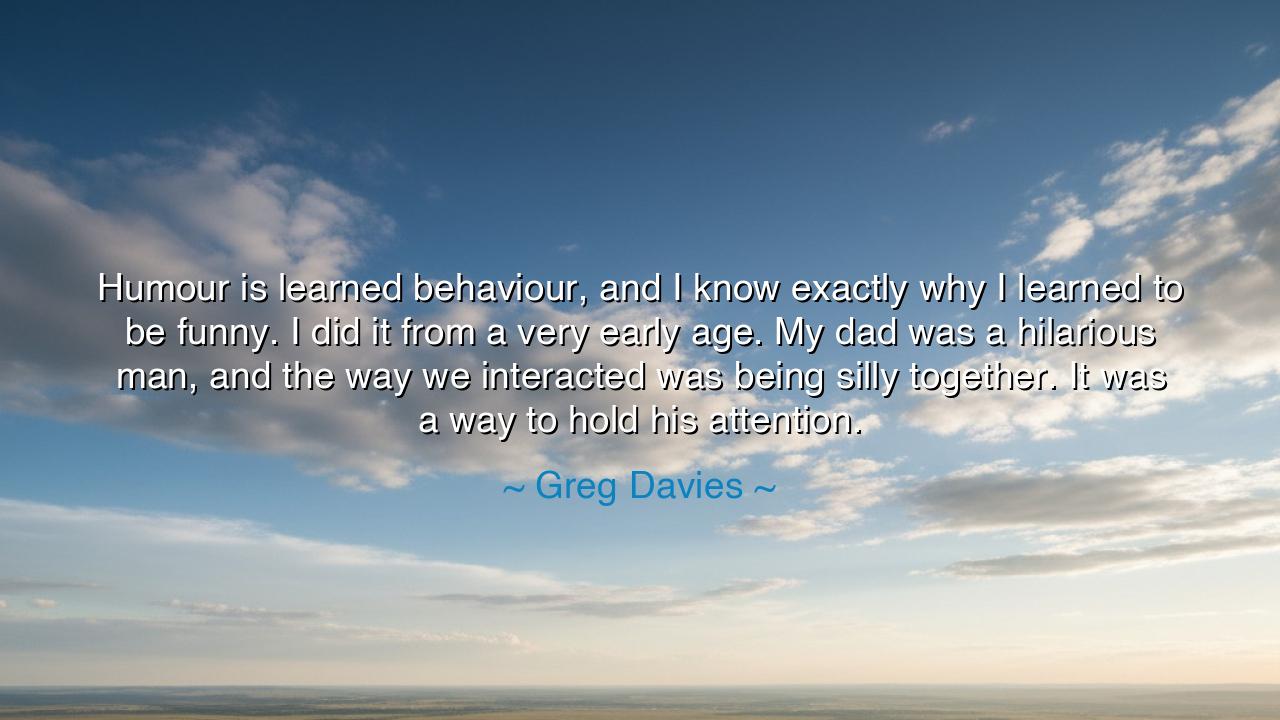
Humour is learned behaviour, and I know exactly why I learned to
Humour is learned behaviour, and I know exactly why I learned to be funny. I did it from a very early age. My dad was a hilarious man, and the way we interacted was being silly together. It was a way to hold his attention.






“Humour is learned behaviour, and I know exactly why I learned to be funny. I did it from a very early age. My dad was a hilarious man, and the way we interacted was being silly together. It was a way to hold his attention.” Thus spoke Greg Davies, the jester-philosopher of our age, who cloaks truth in laughter and reveals tenderness through jest. In these words, he uncovers the secret root of humour — that it is not born merely of wit or intellect, but of love, longing, and the desire to be seen. The laughter of the child is not always the laughter of joy; sometimes, it is the laughter of the heart reaching out for connection.
Davies, in his reflection, reveals that humour is learned behaviour, shaped by our earliest bonds. It is the language of survival in a world that does not always listen. A child learns to cry for comfort, but some — blessed or burdened — learn instead to make others laugh. In doing so, they turn vulnerability into art, fear into play, and longing into light. From his father, Davies inherited not only a sense of comedy but also a sense of belonging — the shared silliness that bridged the distance between two souls. Through humour, he found not only a way to hold his father’s attention, but a way to hold the world’s.
There is in this truth something profoundly human, for humour, though it delights, also defends. Across time, the clown and the fool have not merely entertained; they have survived. In ancient courts, the jester was the only one who could speak truth to the king without losing his head, for laughter softened the blow of honesty. The fool’s mask hid the sage’s wisdom, and jest became a shield against judgment. So too in the life of the individual: the one who jokes often carries beneath his laughter the weight of longing, the ache to be heard, the need to matter.
Consider the life of Charlie Chaplin, the silent comedian whose art made the world laugh even as he wept within. Born into poverty, he turned his suffering into joy for others. Each pratfall, each dance of absurdity, was born not from comfort, but from pain transmuted into beauty. He too learned, as Davies did, that laughter could win love, that humour could draw attention where silence could not. Through this alchemy, Chaplin turned his loneliness into legacy. His comedy, like all true art, was born from a heart that refused despair.
Davies’ insight also teaches that humour, at its deepest, is connection. It is the art of finding resonance in shared imperfection. When two people laugh together, barriers dissolve; pride, fear, and sorrow lose their hold. The father and son, the friend and stranger, are united in that fleeting moment of joy. Yet behind this laughter often lies a fragile truth — that to be funny is also to be vulnerable. The comedian stands before the world saying, “See me, understand me, love me.” And when the world laughs, it answers, “We do.”
But there is also wisdom in recognising that humour, though healing, can hide what it cannot yet face. Many who laugh the loudest carry hidden grief. The great comedians — from Robin Williams to Richard Pryor — remind us that laughter is often born from pain refined into compassion. Davies’ confession shows the courage to look within and see not only the gift of laughter but the wound that forged it. True humour, then, is not mockery but mercy — the ability to turn suffering into light, to transform what once hurt into something that heals.
And so, my children, take this lesson to heart: to be funny is to be brave. It is to stand before life’s absurdities and choose laughter over lament. It is to take the trembling need for love and turn it into something beautiful — a bridge between hearts. Yet remember also to look beyond the laughter of others; for every jest may carry a story, and every smile may hide a storm. Treat those who make you laugh with kindness, for they often give more of themselves than the world will ever know.
Therefore, let humour not be a mask for fear, but a vessel for truth. Use laughter to bring light where darkness dwells, to comfort the weary, to unite the divided. For as Greg Davies teaches through his simple and human confession, humour is not born in emptiness — it is born in love. It is the child reaching for the father’s smile, the lonely soul reaching for the world’s warmth. Learn, then, not only to laugh, but to understand. And in your understanding, you will discover that laughter, when offered with sincerity, is one of the purest forms of love — the heart’s own way of saying, “See me. Stay with me. Remember me.”






AAdministratorAdministrator
Welcome, honored guests. Please leave a comment, we will respond soon